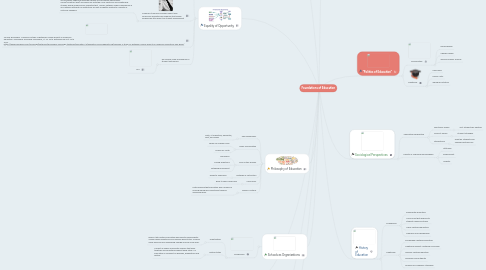
1. sociological curriculum Theory
1.1. Functionalist-
1.1.1. Curriculum concentrates on the function of what is taught in schools and its role in society
1.1.2. Argue that the school curriculum represents the knowledge that students need to become competent members in society.
1.1.3. Schools train students to fit into a less cohesive world.
1.1.4. History and literature are less important than teaching students how to learn.
2. Governance
2.1. Local Board and Superintendant
2.1.1. Usually locally voted or appointed members
2.2. State Board and Superintendant
2.2.1. State wide elected and appointed officials by districts.
2.3. State Government Officials
2.3.1. Senators, Legislators. House of Rep,
3. Philosophy of Education
3.1. Key Researchers
3.1.1. Plato, St Augustine, Descartes, Kant, and Hegel
3.2. Goals Of Education
3.2.1. Ideals can change Lives
3.2.2. Search for Truth
3.3. Role of the Teacher
3.3.1. Discussion
3.3.2. Posing Questions
3.3.3. Establish Enviroment
3.4. Methods of Instruction
3.4.1. Dialectic Approach
3.5. Curriculum
3.5.1. Back to Basic Approach
3.6. Generic Notions
3.6.1. Plato believed that Education was a means of moving individuals collectively towards achieving good.
4. Schools as Organizations
4.1. Comparison
4.1.1. Great Britain
4.1.1.1. Before 19th century education was parents responsibility. Schools were private and rich families hired tutors. Schools since have and are undergoing change and are more open.
4.1.2. United States
4.1.2.1. Consist of public and private schools that work together and sometimes against each other. US education is a product of idealogy, pragmatism and history.
5. Curriculum and Pedagogy
5.1. Historical curriculum theory
5.1.1. Social Efficiency-Division of knowledge into defined areas and its transmission into defined goals and objectives . Students divided based on ability.
6. Equality of Opportunity
6.1. Educational Achievement
6.1.1. Females achieve at higher levels in reading at ages 9,13,17. Females achieve at slightly higher levels in Math at age 9 and lower at age 13 and 17.This according to The National Center for Educational Statistics -The Condition of education.
6.2. Coleman StudyThe Coleman Report was commonly presented as evidence that school funding has little effect on student achievement
6.2.1. Response: In the past twelve years a body of empirical knowledge has accumulated, beginning with the equality of educational opportunity survey(Coleman 1966) and based on both the cross-sectional and longitudinal studies, which unequivocally indicates that , overall, between school differences in any measure attribute of institutions are only modestly related to a variety of outcome variables.
6.3. Source: Boundless. “Coleman's Study of Between-School Effects in American Education.” Boundless Sociology. Boundless, 21 Jul. 2015. Retrieved 25 Oct. 2015 from https://www.boundless.com/sociology/textbooks/boundless-sociology-textbook/education-13/education-and-inequality-98/coleman-s-study-of-between-school-effects-in-american-education-553-8976/
6.4. Do schools make a difference in student outcomes?
6.4.1. YES
7. Educational Inequality
7.1. Functionalist
7.1.1. Belief that schools role is to provide a fair and meritocratic selection process for sorting out the best and brightest individuals, regardless of background.
7.1.2. Hard work-Individual talent
7.2. School Financing
7.2.1. Public
7.2.1.1. Financed by local,state and federal sources. Majority comes from local anes.d state such as property tax. This creates a difference because of property values are higher in affluent areas.
7.2.2. Private
7.2.2.1. Funded by tuition; private grants; and fundraising from parents, alumni, and other community members.
8. “Politics of Education”
8.1. Conservative
8.1.1. Ronald Regan
8.1.2. Charles Darwin
8.1.3. William Graham Sumner
8.2. Traditional
8.2.1. Hard Work
8.2.2. Family Unity
8.2.3. Individual Initiative
9. History of Education
9.1. Progressive
9.1.1. Experiential Education
9.1.2. Curriculum that respond to student needs and times.
9.1.3. Child-centered education
9.1.4. Freedom and Individualism
9.2. Traditional
9.2.1. Knowledge-centered education
9.2.2. Traditional subject-centered curriculum
9.2.3. Teacher centered edcation
9.2.4. Discipline and Authority
9.2.5. Defense of Academic Standards
9.3. Interpretatluenceion and Inf
9.3.1. Horace Mann- Education is the Great Equalizer
10. Sociological Perspectives
10.1. Theoretical Perspective
10.1.1. Functional Theory
10.1.1.1. Sort Students by Abilities
10.1.2. Conflict Theory
10.1.2.1. Student Struggles
10.1.3. Interactional
10.1.3.1. What do Students and Teachers actually do?
10.2. Effects of Schooling onIndividuals
10.2.1. Attitudes
10.2.2. Employment
10.2.3. Mobility
11. Educational Reform
11.1. School-Business Partnership
11.1.1. Boston Compact 1982
11.1.1.1. Form partnerships to promote revitalization of students to improve economy
11.1.2. Gates Foundation
11.1.2.1. Small Schools
11.1.2.2. Teacher Effectiveness
11.2. Political Reform
11.2.1. NO CHILD LEFT BEHIND
11.2.1.1. George W Bush
11.2.1.1.1. Testing
11.2.1.1.2. Report data school by school
11.2.1.1.3. Must meet AYP
11.2.1.1.4. Highly Qualified Teachers
